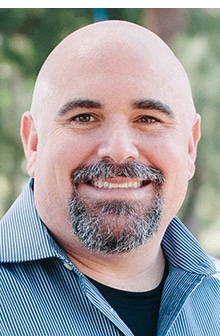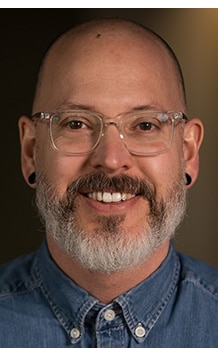By Chris Moon
NewThing is launching a digital church-planting effort it hopes will spark hundreds of new churches during the next year.
Jeff Reed, director of Region 10 for the Chicago-based group, said the initiative already has drawn interest from 300 prospective church planters.
“The plan is to start looking at digital space and the metaverse as communities where people are gathering,” said Reed, who started working with NewThing in January after a two-year stint at Stadia Church Planting.
NewThing has nine other regions—all geographically bound, such as North America, Sub-Saharan Africa, and Latin America. The organization is involved in thousands of church plants across those nine regions each year.
“Region 10” recently was created as NewThing’s digital realm.
“For us, [it is] whatever it takes to mobilize digital missionaries all over the world,” said Eric Metcalf, associate global director for NewThing, which is a ministry of Community Christian Church in Naperville, Ill.
Community Christian Church, Metcalf said, has been working with the idea of micro-churches in recent years, and that has led the church into the realm of digital church planting. The COVID-19 pandemic and the growing need for online church options has given the effort more momentum.
“I do not see it going away,” Metcalf said.
NOT NECESSARILY A NEW THING
One reason it won’t go away is the increasing number of people who have wide social networks that exist entirely online. Metcalf noted some of his 14-year-old son’s best friends are online friends.
“There’s something there the church is oblivious to right now,” he said.
Metcalf uses the term “digital missionaries” to describe Christians who gather believers out of these online social networks into digital faith communities. They would form the front line of digital church planting.
Of course, digital churches aren’t a recent innovation, said Reed, who has been working with them for years, including with his own start-up company—THECHURCH.DIGITAL.
He said the oldest digital church he knows of is 10 to 12 years old.
At the same time, “because of COVID, the idea of digital ministry has gotten a lot more credibility.”
Reed said the idea at NewThing is to launch digital churches in the United States and around the globe that typically are led by bi-vocational or co-vocational pastors.
Some of those digital churches will emerge from other already-existing affinity groups that gather online.
For instance, Reed said he knows of a barbecue enthusiast who gathers on social media with other barbecue lovers and wants to build a digital church out of that “foodie” community.
“What we’re finding is people are connecting to others,” Reed said. “Through these relationships, you can point people to Jesus.”
A FOCUS ON DISCIPLE-MAKING
Digital churches can take a lot of different forms, Reed said.
Some may resemble traditional in-person churches by centering themselves around a weekly gathering—on Sundays or at another time through Zoom or other video platforms.
But other digital churches might not be as interested in meeting at a specific time. These “asynchronous” churches would gather through various text-based avenues—such as Discord, a Slack channel, or WhatsApp—for prayer and encouragement.
Reed was quick to note “there’s strengths and weaknesses to all of the opportunities.”
From an ecclesiological perspective, some may find digital churches to be deficient. But Reed said it will take years to determine the long-term outcomes of such forms of gathering.
Reed said digital church in all its forms tends to de-emphasize the central weekly worship service in favor of discipleship efforts. Instead of coming to church simply to consume a worship experience, digital churchgoers tend to spend more time learning from one another about the faith.
“It’s really the heart of what we’re trying to do,” Reed said. “The goal is to really lower the standard on church and, at the same time, raise the standard on disciple-making.”
He said disciple-making can be more robust in a digital format.
Because churchgoers don’t have to get in their cars to drive to a specific location for a small group or a Sunday school class, they tend to meet more frequently. They also don’t have to round up childcare for their kids.
And some people find it easier to share their thoughts and experiences in a digital format, Reed said.
He described one conversation he had recently with a couple through a video format. The wife started crying in a matter of minutes as some deep feelings were revealed after they talked only a short time.
“The conversation got very deep and very intimate very quickly,” Reed said. “We were not in the same space. . . . She was far more open than she would have been in a physical space.”
Reed added, “When you talk to people who do digital ministry, they will tell similar stories.”
STRIVING FOR CONVERSATIONS
But how does one know a digital church is successful and that people are being transformed by the gospel?
A digital church should look for ways its members are adopting new habits in the physical sphere, Reed said.
He said it is important for digital church planters to get to a point of having one-on-one conversations with people—of moving beyond just broadcasting a message. Again, that conversation could take place through a variety of formats—from video to text to virtual reality.
“The goal is to have individual conversations,” Reed said.
And the 300 prospective church planters who have already reached out to Reed about starting digital churches is indicative of the interest.
“It’s not that I need to find them. They are finding me,” he said, adding, “I would love to see hundreds come out of this.”
Metcalf said NewThing will work hard to train and apprentice digital church planters. It also will work to establish networks of churches that can work together to plant new ones.
Under that model, hundreds of new digital churches within a couple of years are a possibility.
“I could totally see that happening,” Metcalf said.
Chris Moon is a pastor and writer living in Redstone, Colorado.



Hebrews 10:25 NIV
[25] not giving up meeting together, as some are in the habit of doing, but encouraging one another—and all the more as you see the Day approaching.
In a world growing more and more apart in relationships, this is a wrong path!
Christians need one another in person worship and sharing… our fellowship is with the Father and His Son.
1 John 1:1-4 NIV
[1] That which was from the beginning, which we have heard, which we have seen with our eyes, which we have looked at and our hands have touched—this we proclaim concerning the Word of life. [2] The life appeared; we have seen it and testify to it, and we proclaim to you the eternal life, which was with the Father and has appeared to us. [3] We proclaim to you what we have seen and heard, so that you also may have fellowship with us. And our fellowship is with the Father and with his Son, Jesus Christ. [4] We write this to make our joy complete.
2 Corinthians 13:14 NIV
[14] May the grace of the Lord Jesus Christ, and the love of God, and the fellowship of the Holy Spirit be with you all.
There is a presence of the Lord when Christians come together physically!
Then, there is the face-to-face thingy – ‘Where Two or Three Are Gathered’! Jesus said He would be there! Sounds a lot like HomeChurching – similar to HomeSchooling. Thereat, varietal resources from experts available for becoming a better disciple of JC, versus, the quote from above: ‘digital churchgoers tend to spend more time learning from one another about the faith.’ That is the electric version of how once an Elder invited us to his SS Class. Where, ‘we read a verse, then we all tell what it means to us’! That’s an Ignorance Pool!
Just another Gimmick headed for failure. When will Rich Americans learn to take care of the orphans and widows in their distress whom are found outside of US borders in earnest (James 1:27)? Most Christian Americans do very little for them. Never have and never will. They just make excuses and instead waste Billions on unfruitful programs. https://www.youtube.com/watch?v=ekkRd0Vg3c4